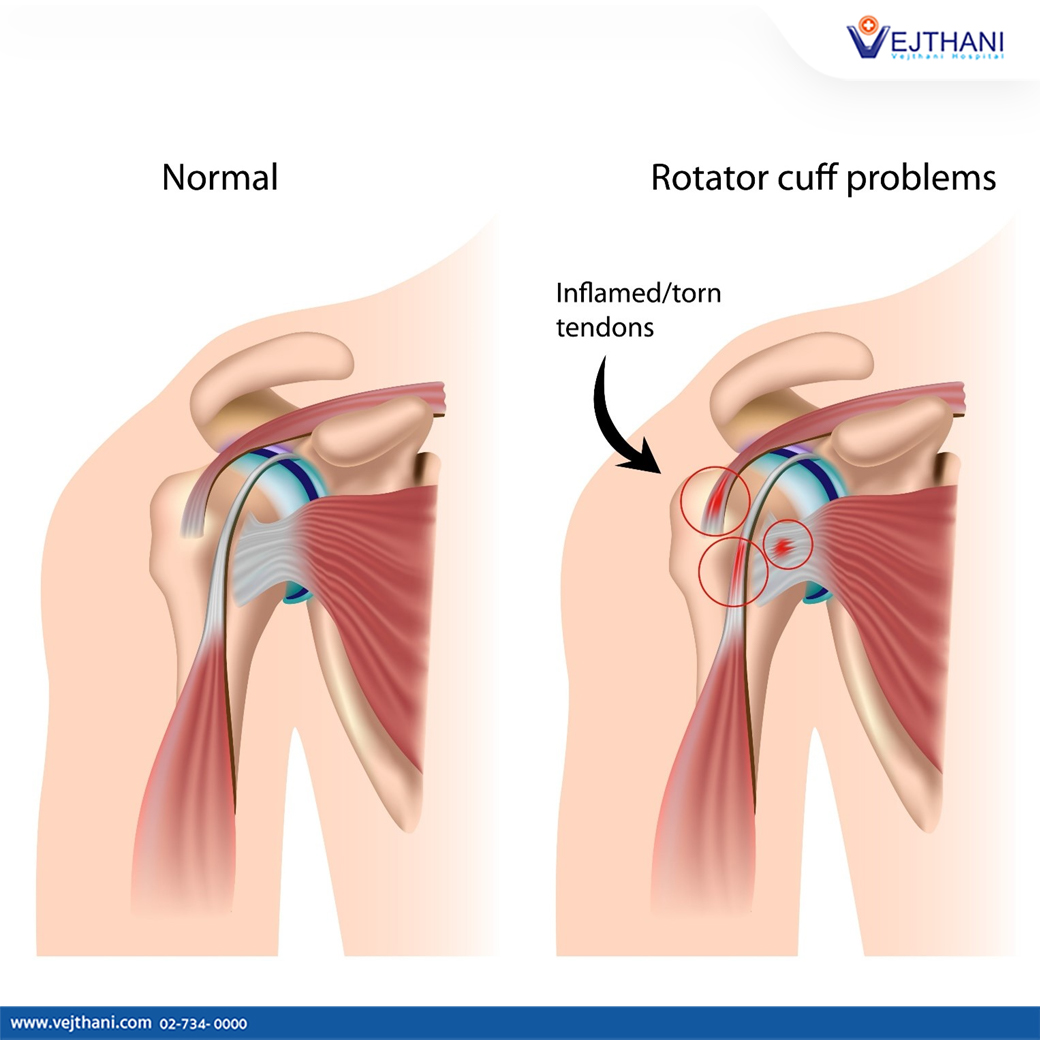Plantar Fasciitis Explained: Causes, Symptoms, And Recovery
Learn what plantar fasciitis is, its causes, symptoms, and the best treatment options available at Vejthani International Hospital in Bangkok.

Rotator cuff tendonitis, also referred to as shoulder impingement, is caused by a tendon catching on the surrounding tissue when you try to lift your arm. The rotator cuff is the elastic tissue in your shoulder that connects your arm muscles to the top of your shoulder.
A case of shoulder impingement can get better after a few weeks or months with proper exercises prescribed by a physiotherapist. But when your shoulder doesn’t respond to exercise, other treatments may be needed to restore the normal range of motion to the shoulder.
Rotator cuff tendonitis can seem to occur suddenly when you perform an extreme shoulder movement, or the shoulder pain can grow in intensity until it restricts the range of motion in your arm. You may have a case of shoulder impingement if:
Your arm and shoulder will not usually be stiff. You should be able to carry on with everyday activities, as long as they don’t require you to lift your arm above your shoulder.
If your condition matches those of the symptoms of rotator cuff tendonitis, you should see a doctor. This is particularly true if your job or other regular activity is impossible to complete with the apparent symptoms.
As mentioned above, shoulder exercises are the usual first course of treatment. But you should see a doctor as soon as you notice the pain and loss of movement. They will examine you and recommend the best course of treatment for you and your lifestyle. For example, an athlete in training may need to have surgery earlier rather than later to maintain their fitness level.
Your doctor or a physiotherapist will be able to prescribe some simple exercises to both improve your shoulder posture and strengthen the shoulder muscles to widen your range of movement.
Give these exercises a bit of time, they won’t work immediately. If you don’t feel that there’s been an improvement in your range of motion or your level of pain after a few weeks, the next treatment is generally steroid injections.
These injections will only be effective in easing your pain if you maintain your exercise routine at the same time. This should be seen as a combined treatment that’s maintained over several weeks. If you still don’t feel that your range of motion has improved after that, and your pain level still seems abnormal, you may require surgery to correct the problem.
Shoulder impingement arthroscopy is the standard surgical procedure to correct rotator cuff tendonitis. If your condition lasts more than six months and doesn’t respond to either exercise or steroid injections, this procedure may be the best option.
Your doctor may prescribe anti-inflammatories before the procedure to reduce swelling in the shoulder. Shoulder impingement arthroscopy can be performed under either general or local anesthesia, depending on the severity of the problem. With a local anesthesia, your shoulder and arm may be numb for up to half a day following the operation.
During the procedure, an arthroscope is used to give the surgeon a view of the problem. A small incision is made in your shoulder, the arthroscope is inserted, and then a few more small incisions are made which they use to access and realign the problem tendon. Once it has been realigned and isn’t catching on the surrounding tissue, the surgeon will reattach it to the bone with sutures.
You may be required to keep your arm in a sling for up to six weeks following the procedure. The doctor may also recommend that you wear a shoulder stabilizer after you remove your arm from the sling. This prevents your arm movement from tearing the sutures and allows your arm to heal.
For any questions about shoulder impingement and treatments for the condition, contact Vejthani Hospital to make an appointment.